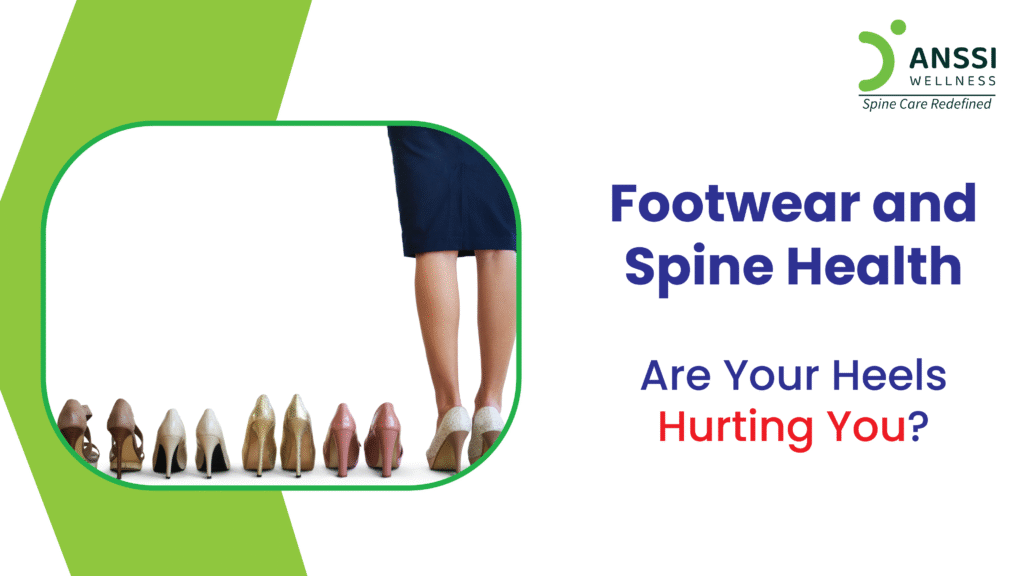Your feet support your entire body every day. Yet, while we meticulously plan our diets and fitness routines, we often overlook the long-term effects of our footwear on spinal health. In particular, many women’s shoe choices, especially high heels, can compromise posture, alignment, and overall back wellness.
Let us see how the shoes you wear intimately affect your spine, and what you can do to safeguard it.
The Connection Between Footwear and Spinal Alignment
Your feet are the body’s support base. Poor footwear shifts your body’s alignment from the ground up.
High heels, for instance, tilt your body forward. This forces your pelvis forward and back to bend more, increasing stress on the lumbar spine and compressing discs and joints.
Shoes lacking proper arch support or cushioning don’t absorb pressure effectively, passing stress upward through your ankles and knees to your back.
Common Footwear Trouble-Makers
High Heels
Heels higher than 2 inches elevate your heel above the toes, creating an unnatural forward lean. To maintain balance, the spine arches excessively, tightening lower back muscles. This exaggerated lumbar curve can spark chronic back pain, disc compression, and postural imbalances over time.
Ballet Flats and Flip-Flops
Though heel-free, these shoes often lack structure. Flat soles offer no arch support or heel cushioning. Without proper support, your feet overpronate or roll inward, affecting hip and spine alignment.
The result? Back, hip, and knee pain due to inefficient shock absorption.
Pointed-Toe Shoes
Narrow toe boxes cramp toes, altering your natural gait. You unconsciously shift weight distribution, placing more pressure on the outside of your feet, throwing off alignment and exacerbating strain on leg and back muscles.
Choosing Spine-Friendly Footwear
Remember the following crucial points.
1. Height Matters
Stick to heels under 2 inches. Even small heels shift body weight forward. Lower, wider heels distribute weight more evenly and reduce spinal stress.
2. Arch Support and Cushioning
Opt for shoes with built-in arch support or add orthotic insoles. Good cushioning absorbs heel strike forces and reduces jarring up the spine.
3. Wide Toe Box
Choose shoes that allow natural toe spread. Your foot needs space to function properly and maintain balance without compromising alignment.
4. Heel-to-Toe Drop
Look for a moderate drop (heel slightly higher than toe) to encourage healthier posture and stepping mechanics.
5. Regular Rotation
Don’t wear the same shoes daily. Alternate pairs to avoid repetitive stress and allow shoe cushioning to reset.
Tips to Reduce Back Stress from Shoes
- Inspect shoes regularly for worn soles or uneven wear patterns; replace them when needed.
- Use supportive insoles if you love flats or heels but need more structure.
- Swap high heels for supportive flats when your situation allows.
- Stretch after wearing heels, especially your calves, hamstrings, and lower back, to relieve tightness.
What to Do if You Have Heel-Related Back Pain
It may be time to reassess your footwear if you notice:
- Chronic lower back pain after standing or walking
- Stiffness in the spine or hips
- Muscle fatigue or imbalance
Consider these steps:
Consult a Specialist
A podiatrist or physiotherapist can assess your gait, spinal alignment, and muscle imbalances, and recommend corrective footwear or orthotics.
Custom Orthotics
Prescribed insoles can correct foot mechanics and redistribute load more evenly through your spine and joints.
Non-Surgical Treatments
Physiotherapy, massage, or non-surgical spinal decompression can help alleviate pain and reset posture.
Posture Training
Incorporate exercises like core strengthening, hip openers, and glute activation into your routine. These support better alignment and allow your pelvis to sit neutrally over your feet.
About ANSSI:
ANSSI Wellness focuses on improving the quality of life for patients suffering from spinal issues, aiming to provide relief where other conventional treatments have failed. Through advanced non-surgical spinal decompression treatment, ANSSI is committed to helping patients avoid surgery and recover in a safe, effective, and compassionate environment.
Connect with ANSSI Wellness on LinkedIn, Instagram, and Facebook for expert guidance.




